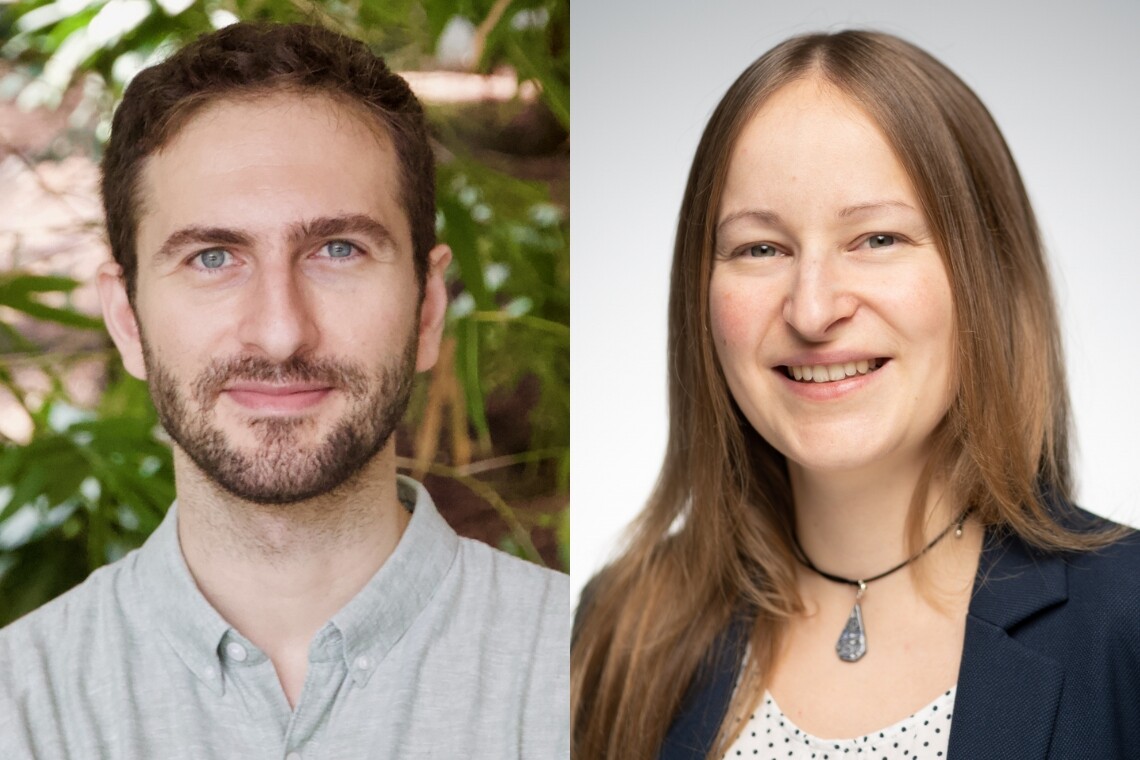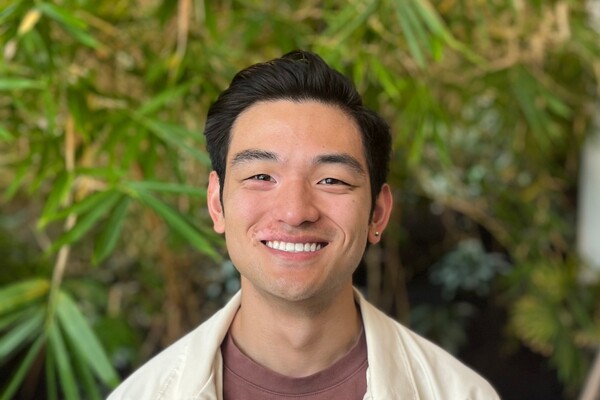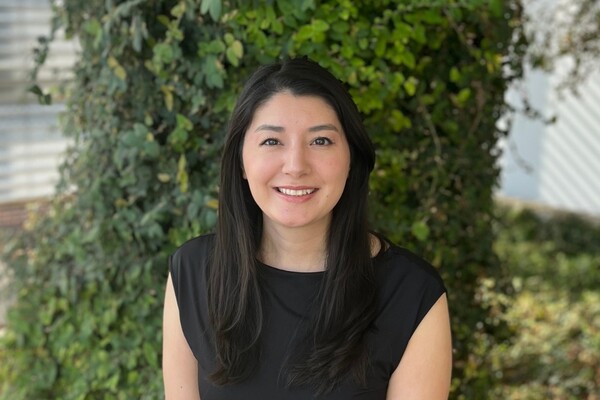Main Second Level Navigation
2024 Research Excellence Award recognizes postdoctoral fellows studying the role of proteins in colon cancer and the cell cycle

The Donnelly Centre for Cellular and Biomolecular Research recognizes up to two outstanding postdoctoral fellows or research associates who are conducting research in its labs with the annual Donnelly Centre Research Excellence Award.
The award supports researchers who advance the Donnelly Centre’s mission to collaborate across disciplinary boundaries towards innovation in health and medicine. Athanasios Litsios and Lucie Wolf are the 2024 recipients of the Donnelly Centre Research Excellence Award.
“Athanasios Litsios and Lucie Wolf are integral members of the Donnelly Centre community,” said Stéphane Angers, director of the Donnelly Centre. “They have contributed enormously to their respective labs and research fields, while simultaneously working to improve scientific engagement and community building through outreach. Both postdoctoral fellows have demonstrated leadership and initiative during their time at the Donnelly Centre.”
Mapping the influence of proteins on the cell cycle
Athanasios Litsios is a postdoctoral fellow conducting research under the supervision of Brenda Andrews, university professor of molecular genetics.
Litsios earned his Bachelor’s degree in biology from Aristotle University of Thessaloniki in Greece and the University of Salzburg in Austria before moving to the Netherlands to pursue a PhD in molecular systems biology at the University of Groningen.
While conducting his PhD research, Litsios became fascinated with single-cell biology and how it can be applied to studying cell function at the systems level. He found that focusing on biology at the level of the cell made experimentation easier, while providing a detailed look at how cells function both independently and within tissues and larger systems.
Litsios chose to join the Andrews-Boone lab to continue research in single-cell biology following an encounter with Andrews at a conference that led to a discussion about collaboration. Litsios was drawn to the Donnelly Centre by the prospect of working at a globally renowned research facility with experts in phenomics research – which encompasses the systematic study of phenotypes in organisms through microscopy and biochemistry.
Litsios has since had a rewarding postdoctoral experience conducting long-term, large-scale and complex research projects. Over the last five years, he has expanded the scale at which researchers can study the cell cycle, without compromising on resolution, by increasing the throughput of experimental methods.
During his time at the Donnelly Centre, Litsios led a collaborative effort that generated the first genome-scale characterization of protein movement within the cell throughout the cell cycle. The research team behind the study demonstrated that changes in protein concentration within the cell tend to be involved in regulating the different phases of the cell cycle, while proteins with predictable movement throughout the cell tend to facilitate the cell cycle's biophysical implementation.
In collaboration with Myra Masinas, database analyst for the Andrews-Boone lab, Litsios contributed data from the cell cycle study to a resource developed by lab called The Cell Vision. The Cell Vision contains over 800,000 microscopy images and has been used by at least 10,000 researchers thus far; it continues to undergo expansion.
“This was very interdisciplinary work that required expertise from different domains,” said Litsios. “The Andrews-Boone lab is already quite interdisciplinary, but its collaborations with other researchers – who bring skills in biology, computer science and statistics – make it even more special.”
Beyond his contributions to research, Litsios has also been involved in the science communication and outreach community in Toronto.
In 2023, Litsios served as the Programming Head of Science Rendezvous, the largest STEM festival in Canada, hosted by the University of Toronto. He also supervised a high school student the same year through the STEM Fellowship Research Exploration Opportunity Program for youth from traditionally underrepresented communities in STEM fields. In addition to mentoring and outreach, Litsios serves as a judge for international FameLab competition in science communication.
Litsios is currently a visiting researcher at the Vector Institute for Artificial Intelligence, where he is working with Rahul Krishnan, assistant professor of computer science and laboratory medicine and pathobiology and Canada CIFAR Artificial Intelligence Chair, to build virtual cells using generative models and large-scale datasets of live cell images. This project aims to explore the functions of eukaryotic cells and develop a platform for molecular diagnostics and drug target identification.
Finding new tools and methods to treat colon cancer
Lucie Wolf is a postdoctoral fellow conducting research under the supervision of Stéphane Angers, professor of biochemistry and pharmaceutical sciences.
Wolf was recently profiled as the Donnelly Centre’s 2023 Charles H. Best Fellow. She received the Research Excellence Award for her continued work on identifying proteins that could function as regulators of the Wnt signalling pathway to target cancer cells.
The Wnt pathway involves communication between cells, impacting cell development in the embryo and the maintenance of adult tissue. Mutations in this pathway that result in its hyperactivation can lead to cancer. As there is currently no clinical treatment of cancer cases where the Wnt pathway is hyperactive, Wolf aims to better understand the pathway to harness it.
Wolf is making use of induced proximity methods to target effector proteins of the Wnt pathway that were previously considered to be ‘undruggable’. Theses methods involve molecules that transport effector proteins to cellular machinery that degrades them.
Wolf is targeting one particular effector protein called beta-catenin, which is essential to the Wnt pathway through its roles in signal transduction in the cell nucleus and cell-cell contact in the membrane. Beta-catenin is usually upregulated in colon cancer cases; its removal from the Wnt pathway stops tumour progression.
Wolf developed a strategy for screening nearly all human proteins, in collaboration with the lab of Mikko Taipale, associate professor of molecular genetics, to find those that could regulate beta-catenin. The Taipale lab has expertise in conducting screens for targeted protein degradation and stabilization, having published a study earlier this year on a new platform they helped to develop to find effector proteins for treating disease.
Some of the 42 resulting hits from Wolf’s effector protein screen took her by surprise, offering new potential methods for regulating the Wnt pathway.
Targeted protein degradation is typically associated with a widespread regulatory protein called ubiquitin. Wolf, however, identified several kinase proteins that were also found to be strong regulators of beta-catenin. This new finding indicates that phosphorylation, in addition to ubiquitination, of target proteins is an effective method of degradation that is worth exploring.
Following experiments to identify and confirm effector proteins to target colon cancer cells, Wolf is now collaborating with the lab of Philip M. Kim, professor of molecular genetics and computer science, to design peptides that can regulate beta-catenin.
“The goal is to develop small molecules that degrade beta-catenin to be used as therapeutics for colon cancer,” said Wolf. “We aim to create tools for researchers to consider other targets and expand on the concept of using kinases for protein degradation.”
In addition to developing tools that can be shared across the research community, Wolf strongly believes that knowledge transfer is an important responsibility that scientists should undertake. She has personally been engaged in science outreach throughout her academic career, and particularly during her time as a postdoctoral fellow at the Donnelly Centre.
Wolf organized the Donnelly Centre’s booth at U of T’s Science Rendezvous festival in 2023 and 2024, leading family-friendly activities that showcase DNA extraction and the use of CRISPR technology in gene editing.
Wolf has also taken on many leadership roles over the last two years, including joining the organizing team for the Donnelly Centre Retreat in 2023 and 2024, helping to revive and organize the Donnelly Centre postdoctoral fellow and research associate seminar series and mentoring graduate and undergraduate students.
News



